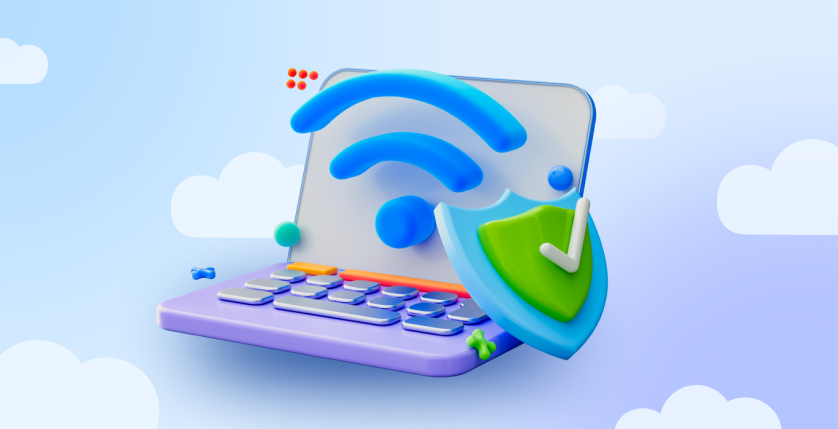In the age of digital progress and the prevalence of the Internet in our daily lives, protecting personal data is of utmost importance. The constantly growing number of online services and digital platforms makes us more vulnerable to privacy breaches.
Effective ways to protect personal data online
- 23.04.2024
- Posted by: Admin

So how to protect personal data online? To protect personal data from cybercriminals, viruses, and unexpected bank card charges, it is necessary to use specific methods and protection rules.
The most effective ways and tips:
1. Use strong passwords and two-factor authentication
Setting up strong passwords for all your online accounts is the first step to protecting your personal data. Consider using a combination of uppercase and lowercase letters, numbers, and special characters. And the best thing to do is to use phrases in passwords that are not related to personal information.
In addition, having two-factor authentication (2FA) enabled will make it even more secure, as logging in will require not only a password but also an additional verification code sent to a mobile device or an answer to a secret question.
2. Public Wi-Fi
Avoid using open public Wi-Fi networks. This will help reduce the risk of your data being intercepted.
Please note:
- When using public Wi-Fi networks, make sure they are encrypted and also use virtual private networks (VPNs) to provide an extra layer of privacy. Don't forget that you can always use mobile internet, which is considered a more secure option.
- It is important to connect only to the HTTPS protocol, as it is more secure. For this, look for the padlock icon at the beginning of the link bar. This icon indicates that the connection is secure.
3. Suspicious links, messages, and attachments
You can often see that cybercriminals design their fraudulent schemes to look like real messages from a bank, utility company, or other legal entity. It is important to pay attention to the email address, website name, and spelling mistakes. Also, remember to never open suspicious emails, instead add them directly to the spam folder or delete them immediately. Don't open attachments from these emails, as this can directly compromise your personal data.
4. Anti-virus and anti-spyware programs
Install anti-virus and anti-spyware software to protect your computer from malware and data breaches. Remember to update such programs in case of need. Also, scan your computer from time to time to detect existing and potential threats.
5. Regularly update the software
Updating operating systems, browsers, and programs regularly will help avoid potential issues that could be used by attackers to obtain your data. This is why developers are constantly releasing patches and updates to improve security.
6. Data backup
A regular backup of your data is an important step in protecting them. This way, if something unexpected happens, you can always restore the necessary information. While backing up data, make sure to store the files in a secure place, such as a reliable cloud environment.
7. Sharing personal information
Social media allows people to share a lot of personal information. So, always be careful about what you post online. Avoid sharing your geolocation, city of residence, date of birth, credit card number, or other personal information that could be used by cybercriminals targeting your privacy.
The rules for using the Internet on mobile devices.
1. Auto-lock the screen
Enable the auto-lock feature on your mobile device to prevent unauthorized access. Set a password, PIN, pattern, or use biometric methods such as fingerprint or face recognition.
2. Remote device control
Activate the remote device management feature, which allows you to remotely lock, localize, or even wipe data on your mobile device in case of loss or theft. This feature is available in many modern operating systems.
3. Use apps from official stores
Always download applications only from official stores, such as Google Play for Android or the App Store for iOS. It helps to avoid downloading malicious apps that might compromise the security of your device.
4. Linking your SIM card to the passport
Link your SIM card to the passport or other identification document in case it is possible. By doing so, scammers will not be able to use your phone number, as the operator will ask for the original identity document during the application process for a duplicate SIM card.
5. Disabling rarely used features and applications
Regularly look through your list of applications and features on your mobile device and disable and uninstall those that you don't use often. This will minimize the risk related to unnecessary apps and features that could potentially jeopardize security and privacy and help prevent hackers from gaining access to devices.
Nowadays protecting personal data online is not only a must, but also an important aspect of digital life. Adopting effective methods of protecting personal information is important not only to avoid cyber criminals but also to preserve personal trust in the Internet and digital technologies.
While there are numerous dangers online, it is up to you to take the initiative and ensure that your personal data is protected. The above recommendations will help you significantly reduce the risk of data loss.


